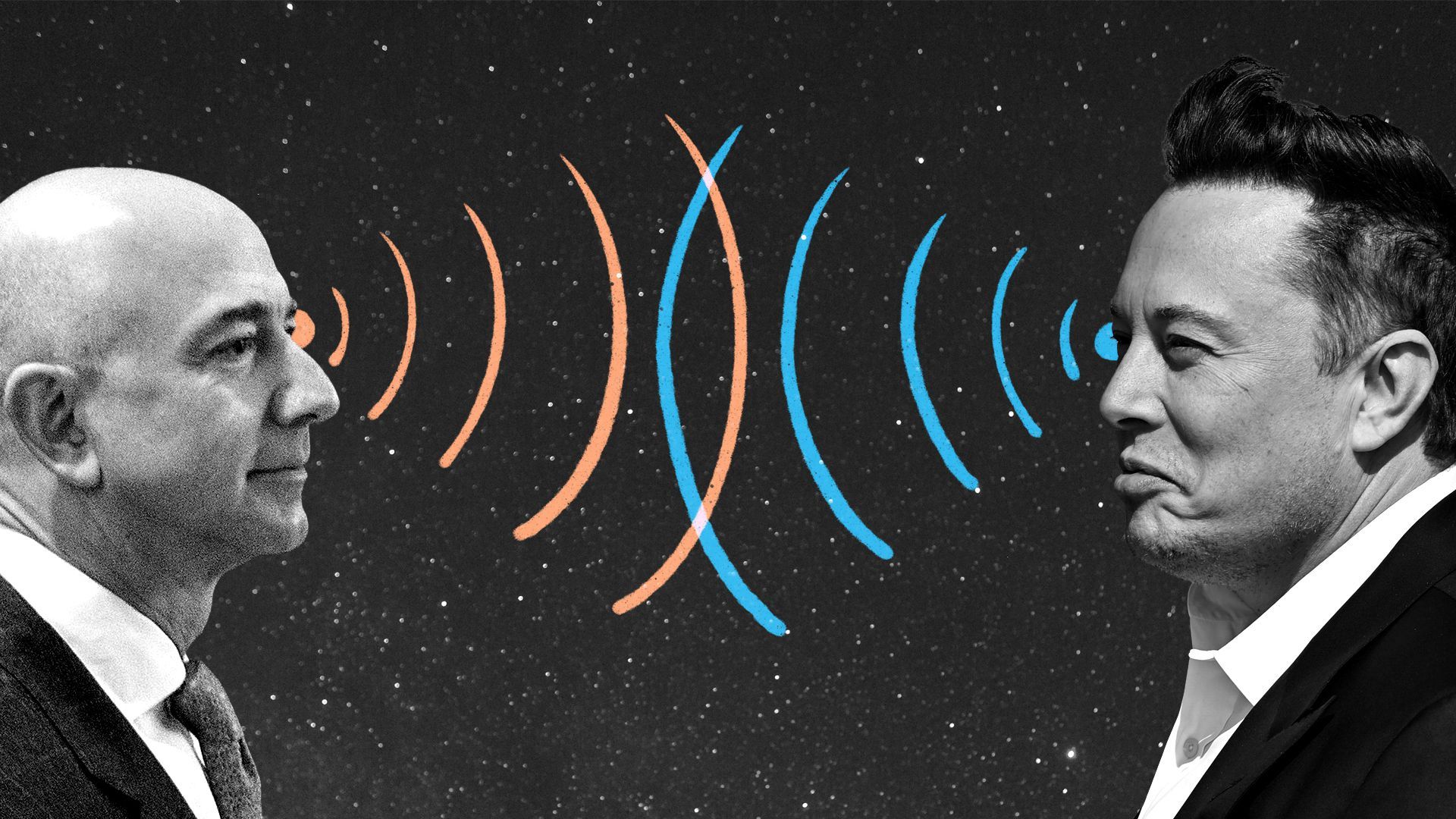The billionaires' brawl over satellite broadband
Add Axios as your preferred source to
see more of our stories on Google.

Photo Illustration: Brendan Lynch. Photos: Drew Angerer, Patrick Pleul, Alex Rodriguez, Pakin Songmor/Getty Images
Elon Musk is under siege by fellow billionaires at Amazon and Dish as he tries to get his fledgling space-based broadband service off the ground, with clashes involving airwave overload and the threat of satellite collisions.
Why it matters: Musk's Starlink service could extend broadband to unconnected customers in hard-to-reach rural areas. But competitors are pressing the Federal Communication Commission to stymie Musk's plans.
Driving the news: The Federal Communications Commission voted Tuesday evening to explore letting companies deliver 5G wireless services over the same airwaves SpaceX is using for its satellite broadband program.
The catch: Even space only has room for so many services. SpaceX is locked in parallel feuds with Dish and Jeff Bezos-run Amazon over how best to divvy up both airwaves and physical space in orbit.
Catch up quick: SpaceX's Starlink and Amazon's Project Kuiper both plan to use constellations of satellites to provide high-speed broadband to customers. Meanwhile, Dish is working to deploy a 5G wireless service meant to compete with AT&T, Verizon and T-Mobile.
- SpaceX has launched more than 900 satellites as part of its planned 4,400 satellite constellation.
- Amazon received FCC approval in July for 3,236 satellites to deliver broadband, but has not yet launched a service or deployed any satellites, whereas SpaceX already has beta customers.
Where it stands: Dish, the satellite company founded by billionaire Charlie Ergen, has urged the FCC to allocate the airwaves covered by the FCC's new study for 5G service.
- RS Access, a company backed by Dell Technologies founder Michael Dell that owns licenses in the band, also supports the agency exploring them for 5G. "We need to be really aggressive in terms of how we identify and how we use frequency in the marketplace," CEO V. Noah Campbell told Axios. "There’s not a lot of it out there.”
- SpaceX fears 5G services would interfere with Starlink, with Elon Musk calling FCC Chairman Ajit Pai and other commissioners to warn against the "severe risk" rule changes could pose to his satellite broadband service.
Yes, but: The FCC has stressed that its proposal doesn't reach conclusions and notes the investments that SpaceX has made and the benefits of its service. The agency could still drop the 5G idea and give SpaceX a clear path.
Of note: SpaceX won nearly $900 million in subsidies from the FCC recently to support deployment of Starlink.
Meanwhile: Amazon engaged in a months-long lobbying battle urging the FCC to block a SpaceX request Amazon says would threaten its own plans for a satellite broadband constellation.
- SpaceX sought FCC permission last year to lower the planned altitude of more than 2,800 satellites.
- On Friday, the FCC allowed SpaceX to launch 10 satellites at the lower altitude in an order that largely followed a suggested path forward from Amazon. The FCC deferred action on the rest of the SpaceX request.
- Amazon has argued that SpaceX's request to lower the altitude of its constellation would increase the risk of collision with its yet-to-be launched network of satellites.
What's next: The broadband satellite war at the FCC will heat up as companies fight over increasingly crowded airwaves and orbital space.
